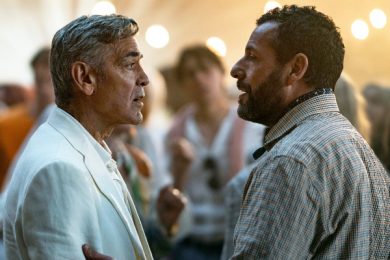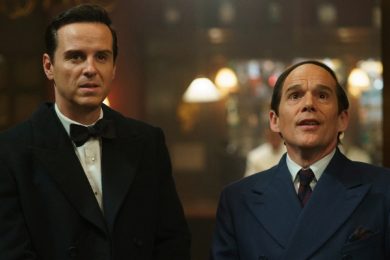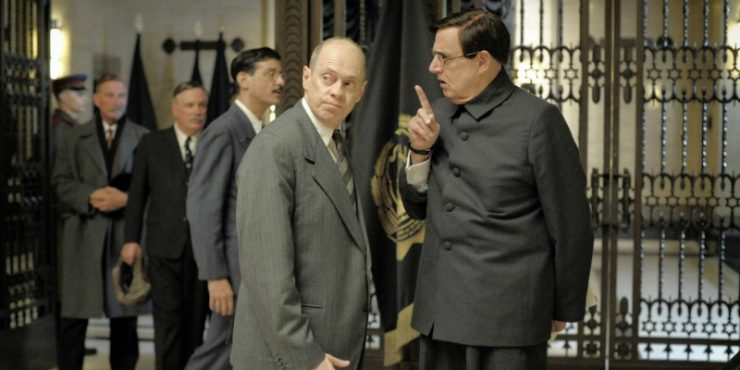Armando Ianucci’s brand of political satire is so biting, so eviscerating, scattershot, and so specific in its intricate detailing of byzantine bureaucracy. How does something so obtuse and blunt in its delivery also manage to be so hysterically funny? The absurdity in his productions come with a tinge of reality that states without ambiguity that the true absurdity lies in the ways we choose to govern, not the actions of the governors. He has a knack for blasting holes into our politicians’ appearances of docility, and exposing the chaos behind them. Another of his feature films, In The Loop, was a remarkable feat of verbal dexterity and political know-how, which was then recycled into his most famous property, the HBO series Veep. Ianucci has cashed in all this goodwill to make The Death of Stalin, a period piece about the pure insanity of Soviet politics.
As the title suggests, the film chronicles the direct aftermath of Joseph Stalin’s death and how all of those beneath him scrambled and schemed to grasp power within the Soviet Union. The cast of characters, all major players within the Soviet party, are played by actors of American and British decent. The film takes little regard for portraying the Russians with much humanity, instead choosing the obvious ridiculousness of watching New York-accented Steve Buscemi play Nikita Khrushchev, imbuing the infamous Russian with his usual mix of no-luck outsider and brooding enforcer. Opposite him is British stage actor Simon Russell Beale as Lavrentiy Beria, the head of NKVD, the Soviet security forces. Beria is Stalin’s bagman, the man most directly responsible for various tortures, exiles and many, many deaths. With Stalin gone, Khrushchev and Beria angle for their shot at the abandoned throne.
The two men hope to win the good graces of various comrades, including Deputy General Secretary Georgy Malenkov (Jeffrey Tambor) who must lead the USSR temporarily in Stalin’s place; Stalin’s daughter Svetlana (Andrea Riseborough) whose one of the few people in the entire affair who approaches anything that resembles grace; and Vyacheslav Molotov (Michael Palin) the foreign minister, who unwittingly ends up on an NKVD kill list only to be saved by Stalin’s death. After a brutal era of intimidation and murder in the name of socialism, both Khrushchev and Beria seek the place they feel they’ve earned. Whether or not either of the men will approach leadership with less bloodshed is very much dubious and of apparently little consequence. Power is the endgame, not national success.
The film’s casting is inspired and tongue-and-cheek but Buscemi and Beale create great depth and feeling within their performances. Buscemi, a known entity in the movies for nearly thirty years, gives us all his gifts for comedy and timing in a single role. Khruschev is mostly hapless, literally and figuratively a step behind Beria at every turn. Beale, as the ferocious Beria is loquacious and charming, devilish in his dealings and unflinching in his ruthlessness. The major mistake Beria makes (is it a spoiler if it’s known to history? If you’re unsure, beware spoilers ahead) is thinking he is the only ruthless man in the Soviet Union. Beale’s portrayal of Beria’s maniacal acts of survival is uncanny, hilarious and surprisingly effective. This is one of the best comedic performances I’ve seen in a very long time.
This feels like Ianucci’s darkest narrative. A movie that does not blink in the face of the more harrowing aspects of Stalinism while also showcasing the harshest aspects of blind ambition. The film’s violence is ever-present, though edited around and shown happening mostly off screen, tempered down from their true, bloody reality. This isn’t the kind of black comedy that someone like, say, Danny DeVito makes, and sometimes it’s difficult to tell how much of that is directorial decision or Stalin‘s budgetary limitations. The movie has the filmmaking style of Ianucci’s television shows, a hand-held heavy assortment of shots meant to give the actors a freedom of performance and delivery. It’s not the most impressive piece of filmmaking, but has more conviction than most improv-heavy films of the day. The film seems to be concerned with feeling like a comedy, and that decision pays off most when the film is at its most bleak.
And it shouldn’t be forgotten just how funny this film is. Buscemi and Beale get big laughs, but the comedy burden falls most on the film’s supporting players, including Tambor, whose vanities and insecurities give Malenkov a charming put-upon air, as well as Riseborough, whose straightwoman approach to Svetlana is able to steal many scenes. There’s also Jason Isaacs as Georgy Zhukov, the head of the Soviet Army at odds with Beria’s NKVD; Rupert Friend as Vasily Stanlin, the hapless son whose drinking and violent temper have led him nowhere but squalor; and Paddy Considine, a luckless Radio Moscow employee who’s forced to get creative when Stalin wants a recording of a Mozart recital that he didn’t record.
The way Death of Stalin plays against current and past views of Russia as a country is intricate. I imagine it would be hard to be Russian and not see this movie as mean-spirited, but it would also be hard not to see the truths within it. Socialists regimes, in constant turnover, have led to frequent chaos. This is not some attack on Putin but a snotty poke at the very foundation of Russian political infrastructure. There’s an element to a lot of Iannucci’s work that suggests that all imperialism, no matter what nation it comes from, is bound to turn into the kind of egotistical backstabbing that takes place in his films. But this is the first time he has taken on specific figures in a nation’s history. The result is fascinating, hilarious and a very somber reminder of how one of the world’s most storied nations so frequently ends up in these troubled positions.
Directed by Armando Ianucci










